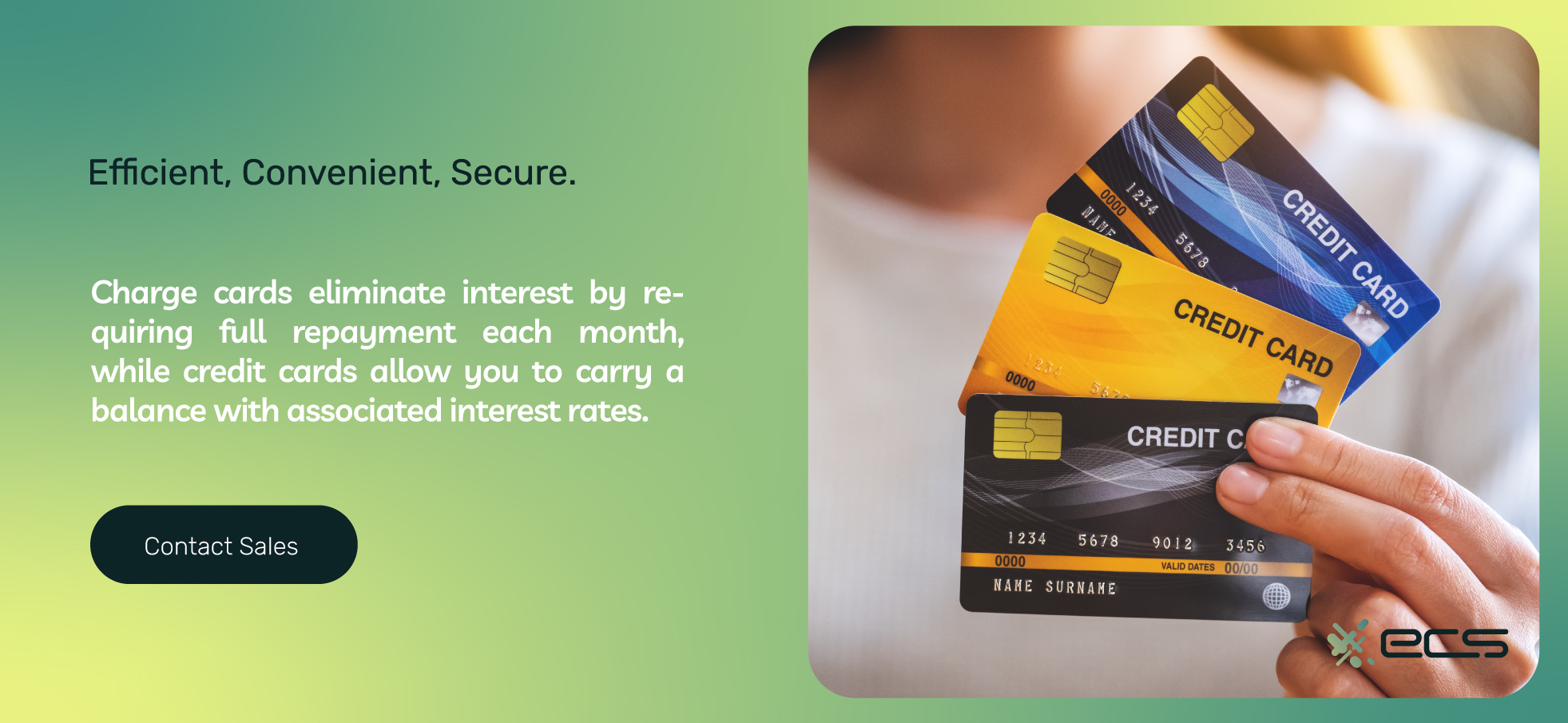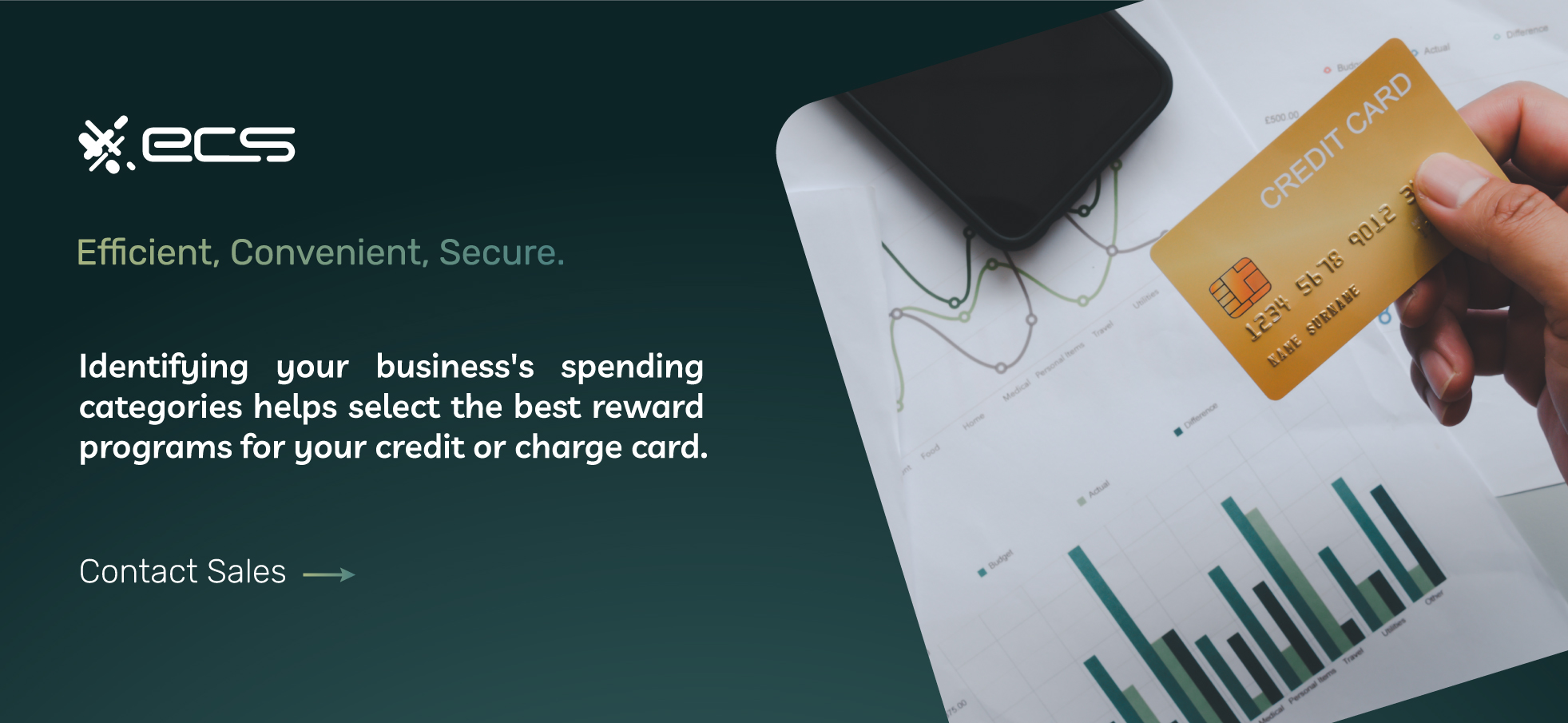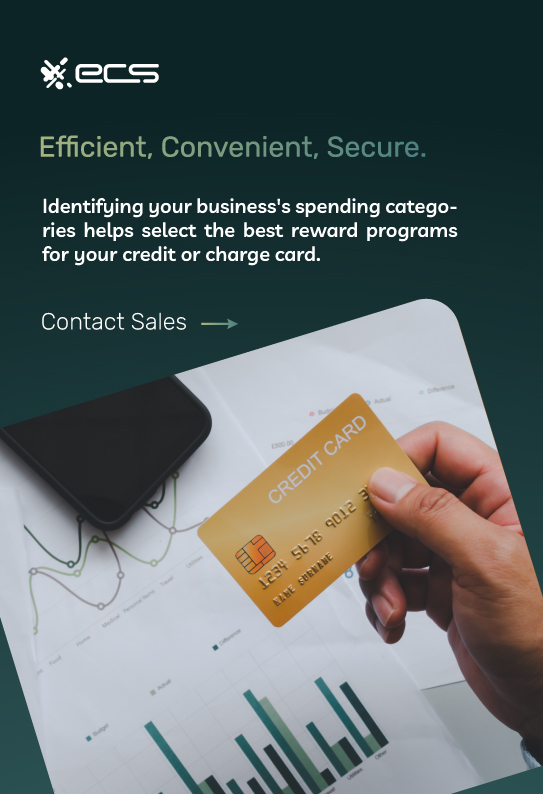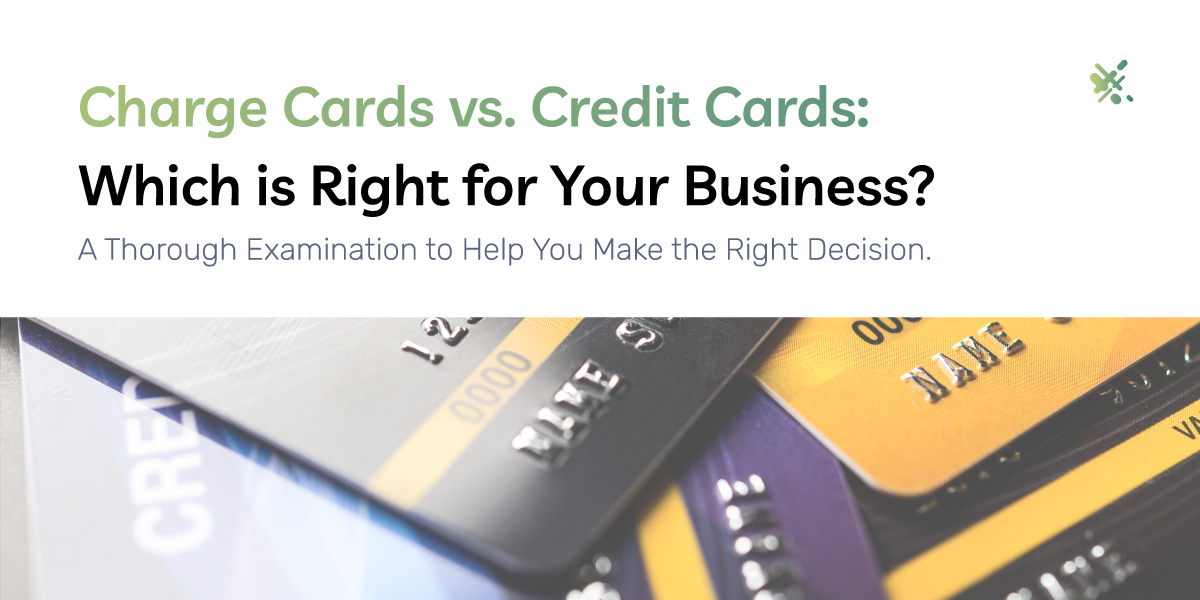Charge cards are often conflated with credit cards. While the two have some similarities, they also have many differences. Let’s compare charge cards to credit cards and see if charge cards are something your business should consider.
On the one hand, you might wonder if your business should accept charge cards from customers and, if so, how that works. On the other hand, you might even be contemplating the possibility of providing your own “in-house” cards for your customers.

Understanding Charge Cards
Charge cards are more similar to credit cards than debit cards. Unlike a debit card, a charge card is not linked to your bank account. However, it’s also unlike a credit card in that there is no credit line attached to the card.
Rather, the card issuer will create spending limits for the cardholder based on their relationship—e.g., the cardholder’s creditworthiness and spending habits (take note that in some instances, this may not be the institutional creditworthiness of an Equifax credit score but an internal scoring system used by the charge card issuers). Typically, charge cards must be paid off every month, and the cardholder cannot carry a balance.
Do not confuse charge cards with store-issued credit cards. Store-issued credit cards are typically issued by a third-party financial institution, such as Synchrony Bank, which is a popular choice among retailers. In fact, charge cards (unlike store cards) are not frequently issued to consumers. This is due, in part, to the fact that balances must be paid off each month.
A business is a better type of charge card holder because it is more likely to have the financial solvency to settle its balance each month. Business charge cards could be used for anything from purchasing inventory to employee-related incidentals like lunch and gas.
One of the biggest draws to using charge cards is the lack of interest. Interest charges are not applicable because the cardholder cannot revolve a balance. Another common benefit is that card issuers often provide rewards and incentives.
Understanding Credit Cards
Now, let’s talk about credit cards. Credit cards represent a line of credit. The cardholder can “borrow” from this credit line by making purchases and carrying their balance over from month to month. Some consumers use credit cards and pay them off in full every month just to get points or cash back through the rewards program. However, other consumers use credit cards to fund large purchases so they can pay over time.
What about small business owners? Like consumers, they might use a small business credit card to for regular expenses and pay it off every month. Or, they might use a business credit card to make a large purchase and pay it off over time.
Credit cards tend to have very high interest rates, however. As a result, business owners might be more inclined to seek other sources of funding, like an SBA loan or even private equity funding (e.g. investors), if they are going to make large purchases or investments.
Let’s focus on the everyday use of business cards for purchases like utility payments, small amounts of inventory, and incidentals like food and travel. Why wouldn’t a business owner just use their checking account for these purchases?
It’s always good to have as much cash on hand as you can. Putting purchases on a credit card allows you to hold on to that cash until more cash comes in from customers or clients. However, in addition to protecting cash reserves, credit card issuers also (as mentioned) provide rewards. In fact, business credit cards typically have the best rewards for all the types of cards.
Charge Card Vs Credit Card Comparison
Let’s review some key differences between charge cards and credit cards. Generally speaking (with some exceptions), charge cards must be paid off each billing cycle, with no exceptions. They typically don’t have preset spending limits. Instead, limits are based on the card issuer’s relationship with the cardholder.
Because the charge card does not carry a balance month to month, interest does not apply. However, other types of fees and charges, such as foreign transaction fees, may still apply. Many are also invitation-only.
By contrast, credit cards are open for applications. Those “invitations” you get in the mail are only pre-approvals, which means the bank has conducted some “preliminary research” into your financial profile and decided you might be eligible for their card. However, getting approved for a credit card, and ultimately the credit line you get, depends on your credit score.


When to Choose a Charge Card
Credit scores are not entirely irrelevant to charge card issuers. After all, a charge card requires payment in full every month. By contrast, credit card issuers just want to know if you can make a minimum credit card payment when deciding if you should be approved.
Consider this: there’s no “when” to choose a charge card. Rather, a charge card chooses you. Sounds tacky, but it’s true. If a financial institution offers you a charge card, it’s a sign that they view your business as creditworthy and trust you to pay it off each month.
Should you accept the invitation? There are some things to assess. Charge cards do typically have annual fees (nothing is free in life, is it). It’s common to see annual fees ranging from $450 to $700 for some premium cards.
It’s time to do the math: if you use the charge card to pay for incidentals and monthly operating expenses, will you generate enough rewards to outweigh the annual fee? Let’s say your business has $50,000 in monthly operating expenses, and you’re offered a card with 1.5% cash back on all purchases. The $9,000 in rewards certainly outweighs a $700 annual fee.
When to Choose a Credit Card
On the other hand, there will be times when a credit card is best. Let’s run with our above example. Suppose your $50,000 in monthly operating expenses (excluding payroll) include $5,000 in fuel charges and $40,000 in grocery and/or wholesale purchases because you run a catering business.
What if a credit card offers 4% back on gas and 3% back on groceries? Now you’re looking at $200 back from fuel and $1,200 back from food. That’s $16,800 annually, far more than the $9,000 that a 1.5% cash-back charge card could offer you.
Some consumer credit cards are better rewards options for business owners than charge cards or even business cards. However, pay attention to rewards caps and limits because they may be far below your annual expenses.
Another situation where credit cards are more advantageous is if you want to finance something over time. Many credit cards (especially consumer cards) come with introductory rates of 0% for 12, 18, or 24 months. Credit card issuers can also provide “balance transfers” to pay off other cards and bring that debt over at a 0% or significantly reduced rate.
Some card issuers even offer a “direct deposit promotion,” where they let you tap into the credit line for a promotional-rate cash advance: something like 0% for 12 months (as an example). You can’t do this with a charge card, so credit cards become a better option for financing larger purchases.
How to Evaluate Your Business Needs
We’ve already provided a “real life” example of a business trying to choose between a charge card and a credit card (business or even consumer). Let’s break it down a little more: what spending categories does your business typically involve? And how much do you spend in each category? This information will tell you what types of reward programs are best.
But your business has other needs as well. Does your business involve any travel? You’ll want to look at some travel-related perks that charge or credit cards offer. Some cards, like American Express (in particular), have unique partnerships with certain airlines or hotels. There may be “ancillary” privileges like airport lounges, early boarding, 24/7 concierge assistance, or travel insurance.
In rare cases, certain B2B suppliers might require you to make purchases with a charge card or even an “in-house” card. This requirement can help them avoid fraud on their end. In cases where you need these suppliers, the charge card is a necessity.

Case Studies and Examples
What type of businesses would want their customers to use charge cards? High-value transactions and travel-related purchases are two areas where charge card benefits are apparent to both the business and the cardholder.
One of the main differences between charge and credit cards is that the charge card is invitation-only. This alone pretty much eliminates all types of friendly fraud. The cardholder knows that if they engage in any “monkey business,” their card payment options for that business will be revoked.
Friendly fraud occurs when a cardholder makes a purchase, keeps an item, or enjoys a service and then claims they are entitled to a refund. They may even double-dip by getting a refund and initiating a chargeback. As unethical as this is, it is rife in certain industries. As many as 60% of travel merchants consider it a top risk.
On the other hand, plenty of businesses won’t benefit from issuing customers a charge card. Businesses with a large volume of low-ticket transactions probably won’t find much benefit in issuing their own cards. However, there is no reason they shouldn’t accept customers’ charge cards to pay.
Book A Demo With ECS Payments
Consumers and business owners love credit card benefits like points. However, some business owners (and consumers) with a strong financial profile may be invited to use a charge card. Charge cards must be paid off, in full. every month. But, they can offer robust points and rewards.
ECS Payments card solutions include the ability to collect charge cards as a form of payment. If your business is also interested in creating charge accounts for your customers or finding the right type of charge card for your business to use, we can discuss that as well. You will need to tailor your product to your business’s needs, considering regulatory, compliance, and capital requirements. Use our contact form online to book a demo of our payment solutions for personalized recommendations.
FAQs About Charge and Credit Cards
American Express, or AMEX as it’s known for short, is the main issuer of charge cards in the United States. Amex also offers some of the best cards for businesses, with robust points schemes and other charge card features.
You should check to make sure you aren’t overpaying to accept credit card payments. At ECS Payments, we offer a complimentary payment processing statement analysis to any merchant who contacts us.
We would love to examine your current rates and explore areas where we can find savings. To request your complementary analysis, contact us online with our contact form or email us at info@ecspayments.com.
If you’re curious about how to set up surcharges, contact ECS Payments via the contact form on our website. We can book a demo to help you better understand the process and requirements for a successful program.
Yes, it can. However, for some businesses, this may be a cost-prohibitive enterprise. You’ll need certain tech hardware and software, risk management procedures, regulatory compliance, and sufficient capital to cover potential losses.
A better option than developing your own product is to speak to your payment processor to see if they can provide and service a white-label product you can call your own.
There are a few minor differences, but overall, many of the aspects of the backend process are the same. Charge cards use “card networks” just like credit and debit cards use Visa, Mastercard, Amex, and Discover. These networks, along with the payment processors, facilitate the transfer of money from the card issuer to the merchant. The customer is then responsible for settling their “tab” every month with the charge card issuer.
Charge cards are more secure because they are invitation-only. Visa and Mastercard have already piloted biometric payment systems as a credit card feature. It’s no longer “science fiction” to consider the possibility of entirely cardless “charge card” accounts that rely on hand, face, or iris scans.
Consider a business that issues charge cards to its own customers. You will know every single customer who has a charge card. You may even see them in person regularly. If anyone attempts to use that charge card or makes an out-of-the-ordinary purchase, you’ll know immediately.
In comparison, when it comes to suspicious debit or credit card activity, you don’t know anything about the person using it or if it’s even their card. You’re totally relying on the banks and card networks to prevent fraud. In this example, we see that charge cards are more secure.
Not if they belong to your customer and you’re not the issuer. However, if you are the issuer, there are risks. You’ll have to become like a bank, in a way, assessing a cardholder’s creditworthiness.
There is always the possibility that if you make the spending limit too high for one month, they’ll charge beyond their means to pay you back. This is just another example of why you should let a third party provide service charge cards for you.
